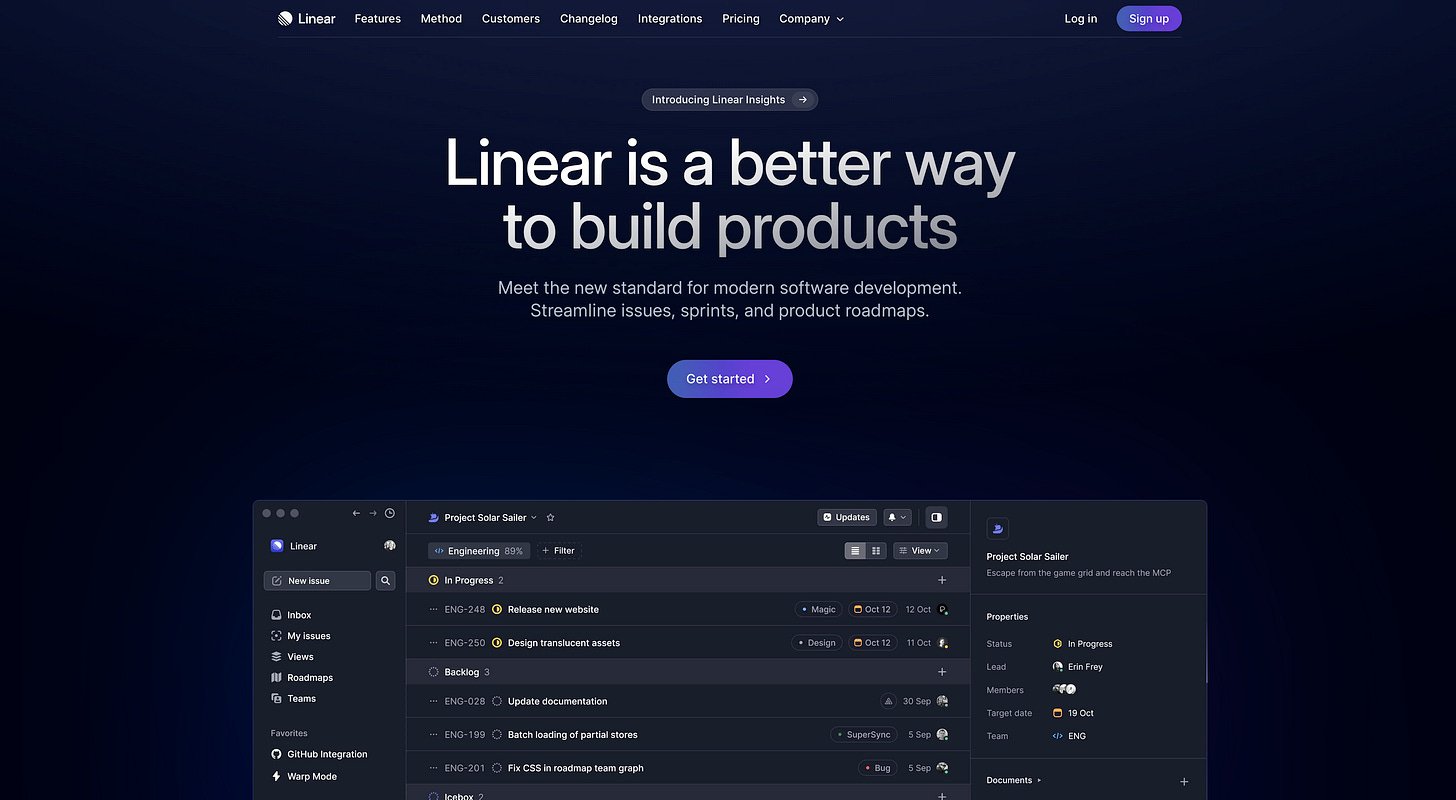Linear | The Future of Product Management and A.I. (2/2)
4 predictions about how artificial intelligence will change product management
My "Interview × Deep Dive" combo is my favorite series that I write. It does two things:
Interview — It gives us the opportunity to learn from world-class founders and product leaders (find my other interviews here).
Deep Dive — It gives us a space to imagine the weird, creative, mind-blowing ways the world might change and, hopefully, inspires us to build something great.
Last week I released my interview with Nan Yu, Head of Product at Linear and this article is the Deep Dive sibling that attempts to answer the question, "what would the world look like if Linear achieved their vision?" It's an exercise in understanding how companies think about the future and, importantly, what we can learn from it.
I try my best not to get TOO far fetched, because I want to stay true to the ideas and the vision cast by the company I'm writing about. But I also give myself room to expound on their ideas because while they probably won't end up building what I write about, it might inspire someone else to build it.
I lead off with this context because this particular deep dive will not only be an exploration of what Linear might become but also a set of predictions about how product management will evolve.
Intro to Linear
If you're not familiar with Linear, it's a project management tool that's taking on multi-billion-dollar behemoth's like Jira and Asana. And at first glance, there isn't a big "key differentiator" that smacks you in the face. It includes the Kanban boards, timelines and tasks that you'd expect from a project management tool along with a handful of features that give it a modern flair like a Cmd+K menu. But overall... pretty straight forward.
Until you start using it...
Linear has built an incredibly loyal following because of their unique method. It's precise. It's simple. And though this word is painfully overused, it's opinionated. And it's this method that not only drives the product forward but, I believe, will change the face of product management. Dramatic much? Maybe... keep reading and you be the judge.
Let's get into it.
Welcome to Making Product Sense
Join thousands of others like you, learning how to build great products and companies from world-class builders.
Linear's Vision
If we look at the landscape of project management tools, they're almost entirely built for PMs. They boast infinite ways to customize, filter, sort, and otherwise manipulate your data. And while it was originally built with good intentions, I believe it's slowly turned into a counter-productive form of job security on par with overly complicated legalese.
A PM might be world-class at product strategy, or product marketing, or data analysis but the endless knobs and dials in current-day project management tools often lead to them spending more time moving data around than actually doing the higher-level work.
So what if that weren't the case? What if managing tasks were simple and running reports were automatic? What if you could get the answer you need in seconds instead of hours, empowering you to make informed decisions and move the product forward?
That's what Linear is trying to do.
In our interview last week Nan, articulated a telling vision for Linear:
"I don't want you spending your entire day in Linear. That would be a failure for us if somebody just spent their entire life managing issues here and there."
—Nan Yu, interview with The Glimpse
For product nerds, reducing session time is a sort of holy grail. The journey is dangerous and there are a thousand ways you could die, but if you reach it, you are granted eternal life.
Down one path, the session time slowly drops, deceiving you into believing you're doing the right thing. Except it keeps dropping and dropping until your users eventually churn and you die a painful death. But down the true path, you'll evade traps, climb mountains and cross roaring rivers to build a product that is SO GOOD that your users get the value in less time this month than they did the month before. The holy grail.
It's a bit meta, but Linear is building a product to help others build products by getting them out of Linear and back to the product they should be building... does that make sense?
Let's move on.
The Evolution of Product Management
Now that we know what Linear's vision is, we can break down the unique method Linear is taking on their quest to find the holy grail. I'm going to structure it in a series of four predictions that act as check points along the path to the grail. As each prediction becomes reality, Linear will take another step toward their vision.
Prediction #1 — We'll return to the basics
"If you're working on a project, it's called a project. It works how you think a project ought to work. Okay. Now that you've taken the five seconds it takes to learn this, go and actually produce software like you intended to do."
—Nan Yu, interview with The Glimpse
Over the last 50 years, different project management methodologies have evolved such as Agile (Kanban/Scrum), Waterfall, Now-Next-Later etc. And while Linear has the bones for each of these methodologies such as a Kanban board, roadmap and timeline, Linear has intentionally shied away from branded words like "user stories," "scrum," or "sprints" in an effort to clarify the work to be done.
Prediction #2 — We'll see highly leveraged PMs assisting larger teams
Linear avoided having a dedicated PM for years. It wasn't until recently that they brought on Nan to lead product and, admittedly, his role isn't your traditional PM role. He stays high level, connecting teams and ideas across the org to ensure product cohesion. His ability to not get lost in the weeds of task management while running product across 25 engineers and 2 designers is a testament to Linear's ability to return to the basics.
"In terms of working on the web app and the Electron app, we basically have two designers and I wanna say 20-25 engineers. And I'm the only dedicated product manager."
—Nan Yu, interview with The Glimpse
As tools like Linear continue to get better at offloading the drudgery of product management, and the capabilities of AI expand, I believe we'll see more and more companies adopt Linear's unusual PM-to-Engineer ratio.
We're already seeing glimpses of PMs learning to embrace the raw power of AI. Lenny Rachitsky recently wrote a great article on the creative ways PMs are using ChatGPT to execute their PM duties faster and better than ever.
ChatGPT isn't a PM-specific tool, nor does it have access to product code or issue databases and yet it's still proving to be a helpful tool in the hands of curious PMs. Imagine what an AI-powered Linear could do!
Prediction #3 — We'll let AI handle rote PM tasks
The last point may have made it seem like PMs will soon be out of a job but I don't believe that'll be the case. Instead, I think we'll see AI augmenting a PM's responsibilities, empowering them to do more than ever before.
If you read the article from Lenny's Newsletter I mentioned above, you'll notice a theme emerge. AI isn't as good at idea generation as humans, but it's fantastic at idea analysis. Give it some raw materials, guardrails and a directive and it can execute very well.
Give it a PRD and it can break it up into the appropriate issues and plot it out on a timeline.
Give it a spreadsheet of user feedback and it can identify the common ideas and rank them by urgency and difficulty.
Give it a data structure and it can write complex queries against it.
Give it a data set to analyze and it can extract patterns that we might never see.
Give it a thesis and it'll make the opposing case to help you reason through your position.
Give it a rough draft and it'll polish it in the style of the company's persona.
What does this mean for PMs and founders? I think it means we'll begin to see a separation between the rote tasks and the creative or strategic tasks. As AI begins to handle more of the "grunt work," it will free up PMs to live at a higher level like Nan, connecting teams, ideas and objectives across the company or product.
Prediction #4 — We'll interact with data conversationally
One of the most important responsibilities of a PM is data analysis to help inform the decisions of the team. Admittedly, this is one area I'm not super great at. I have the right ideas of what I want to measure or understand... but actually getting that data and then slicing and dicing it so that I know what I'm looking at is accurate is more illusive. This is one of the areas I'm most excited about seeing AI integrate with.
"A thing that AIs are good at right now is translating natural language into sort of structured language, right? I have a new idea. Maybe there's a fifth user persona that we weren't considering. Now, can we retag every issue according to this new taxonomy? And previously that would just be like the most annoying thing ever to do in the universe, right? And now it's like, “just let a computer take a first pass at it,” right? And then we can just see if there's something that makes sense."
—Nan Yu, interview with The Glimpse
To Nan's point, AI is really good at understanding intent. So, let's say you have a bunch of data that would take you a week to manually tag before you can analyze it and extract some meaningful insights. AI can ingest and analyze it in minutes, turning a week of work into a simple question answered in real-time. Plus, you didn't need to add some single-use custom tag that clutters up your database.
Conclusion
As one of my Twitter followers so aptly argued, Linear's $5M in revenue is a drop in the bucket compared to Jira's $800M. Isn't it a bit grandiose to believe that they could topple such giants? And I agree - it feels *almost* far fetched. But if you'll humor me, I think I can make a compelling case.
To get a better picture of where Linear stands currently, it's worth looking at their client list which boasts the likes of Cash App, Vercel, Ramp, Retool, Loom, Descript, Arc, Mercury, Levels, Raycast, Superhuman, Unsplash, and OpenPhone. These names are among the hottest young tech companies.
Jira has been around for 20+ years. Give Linear that sort of timeline and I have no doubt that we'll see them not only become irreversibly integrated into the rising stars of the next two decades, but become embedded in the startup zeitgeist. If you're starting a company in 2023, which do you choose - a 20-year old, bloated app or a sleek, fast app that gets out of your way and lets you focus on what you do best: shipping product.
What are your thoughts?
That’s all for this one - I’ll catch ya next week.
—Jacob ✌️
❤️ Smash that heart!
If you enjoyed this article, smash that heart icon to show some love! 🙏







Love the predictions!
Being a Jira user--the capabilities of Linear sound like a dream come true. Then, match that with AI? Sign me up!